|
|
|
Sort Order |
|
|
|
Items / Page
|
|
|
|
|
|
|
| Srl | Item |
| 1 |
ID:
100288
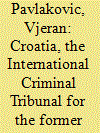

|
|
|
| 2 |
ID:
100286
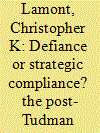

|
|
|
| 3 |
ID:
085512
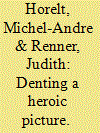

|
|
|
|
|
| Publication |
2008.
|
| Summary/Abstract |
Croatia's foreign policy towards the ICTY and the EU has been marked by ambivalence in the last couple of years. While reluctant to hand over indicated war criminals on the one hand, Croatia has from time to time demonstrated a willingness to fulfill the demands of the international community, and in particular the EU, on the other.
The paper reflects on this seemingly inconsistent behavior and argued that Croatia's foreign policy can be better understood when one takes into account how Croatia remembers its most recent past.
|
|
|
|
|
|
|
|
|
|
|
|
|
|
|
|
| 4 |
ID:
076883
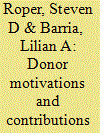

|
|
|
|
|
| Publication |
2007.
|
| Summary/Abstract |
We investigate why states provide a voluntary contribution to war crimes tribunals despite the fact that these tribunals are located in states that offer few economic and strategic advantages. We view tribunal financing as a form of foreign assistance and place the funding of tribunals within the broader foreign assistance literature to explain the motivations of donor states. We examine voluntary contributions to four tribunals, and our analysis shows that there are differences between the gatekeeper stage and the secondary decision to allocate assistance. However, donors generally make no distinction among tribunals for purposes of foreign assistance. As a consequence, purely voluntarily funded tribunals are at a disadvantage, since they are not seen by states as unique and requiring special consideration. Ultimately, the lack of funding calls into question the ability of these tribunals to provide justice to victims as well as serve as a mechanism for national reconciliation.
|
|
|
|
|
|
|
|
|
|
|
|
|
|
|
|
| 5 |
ID:
182452
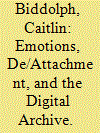

|
|
|
|
|
| Summary/Abstract |
The study of global politics is not an exercise in objectivity and rationality, but one that is embodied, personal, and deeply affective. Feminist scholarship both within and outside of International Relations (IR) have pioneered discussions of embracing our affective experiences as researchers, as well as maintaining ethical commitments to research participants and collaborators. In addition to feminist contributions, the emotional turn in IR has seen the emergence of vibrant scholarship exploring the role of emotions in sites and processes of global politics, as well as the role of emotions in the research process. In this article, I aim to contribute to this growing body of scholarship by speaking to these and other questions that explore the role of emotions in researchers’ engagement with their work. In particular, I draw on and interrogate my own emotional entanglements with the digital archives of the International Criminal Tribunal for the former Yugoslavia (ICTY). The goal of this article is to provide insights into the emotional process of reading and interpreting testimonies of violence, and to illuminate ethical concerns that arise – particularly as an ‘outsider’ – when reading and representing trauma in my research.
|
|
|
|
|
|
|
|
|
|
|
|
|
|
|
|
| 6 |
ID:
188464
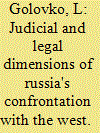

|
|
|
|
|
| Summary/Abstract |
THE WEST'S judicial and legal activities, including efforts to give the military conflict in Ukraine the semblance of an international criminal procedure - putting Russia as a whole, its military, and top officials on trial, as it were - are inevitable and predictable. In the past, international law in its traditional form (and at some point, since World War II, also in the form of criminal procedure) used to take center stage only after the cessation of hostilities, as the victors' right to define a new international order, but these days, it tends to accompany military actions and sometimes even precede them. This has to do with, among other things, the transformation of classical wars into "hybrid" ones that include not only military but also information, economic, and other components and feature no less fierce and crucial legal battles. It also has to do with the unwillingness of certain Western elites to risk their lives on the actual battlefield, participating instead in armchair battles and seeking to appropriate the morally unchallenged legacy of World War II while demonizing the enemy who will allegedly be put on trial at a new Nuremberg tribunal, etc.
|
|
|
|
|
|
|
|
|
|
|
|
|
|
|
|
| 7 |
ID:
104282
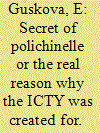

|
|
|
|
|
| Publication |
2011.
|
| Summary/Abstract |
LATE IN THE 20TH CENTURY, the future of the peoples of Yugoslavia no longer belonged to them: it was planned in other countries by top bureaucrats and numerous old and new international structures. The multinational federation was gradually sinking into a crisis punctuated with tragedies, unpredictable and often steep turns and illogical decisions many of them a result of international efforts. Indeed, the Balkan crisis can be described as a glaring example of efficiency and inefficiency of peacekeeping efforts of international organizations which shouldered a misplaced role of arbiters and judges of multisided domestic inter-national conflicts. The lessons to be learned will keep busy many generations of historians and politicians.
|
|
|
|
|
|
|
|
|
|
|
|
|
|
|
|
| 8 |
ID:
125212
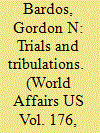

|
|
|
|
|
| Publication |
2013.
|
| Summary/Abstract |
Frederik Harhoff, a justice at the International Criminal Tribunal for the Former Yugoslavia (ICTY), recently charged that the American presiding judge at the tribunal pressured his colleagues to overturn decisions related to war crimes-cases in Croatia and Serbia. Harhoff's allegations subsequently triggered a number of similar accusations of political interference by tribunal insiders and observers. All of this reinforced what many observers have claimed throughout the ICTY's twenty-year existence-that to unacceptable degrees, the tribunal's work is determined not by impartial standards of justice, but by the great powers' political interests.
|
|
|
|
|
|
|
|
|
|
|
|
|
|
|
|
|
|
|
|
|